Search Results
Showing results 401 to 420 of 1066

Mapping Greenhouse Gas Emissions Where You Live
Source Institutions
In this lesson plan, learners examine some of the of greenhouse gas emissions sources in their community.
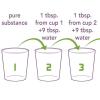
Sniffing for a Billionth
Source Institutions
This is an activity (located on page 4 of the PDF under What's Nano? Activity) about size and scale.

Biobarcodes: Antibodies and Nanosensors
Source Institutions
In this activity/demo, learners investigate biobarcodes, a nanomedical technology that allows for massively parallel testing that can assist with disease diagnosis.

Playtime Paint
Source Institutions
In this activity on page 9 of the PDF, learners make their own paint using chalk as a pigment and glue and water as binders. This activity introduces learners to special mixtures called suspensions.
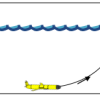
Exploring the Ocean with Robots
Source Institutions
In this activity, learners are introduced to robotic submarines called gliders. Learners make “gliders” from plastic syringes and compare these to Cartesian bottles and plastic bubbles.

Short Circuit
Source Institutions
In this activity about electricity, learners explore what happens when you blow a fuse.
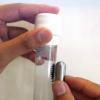
Exploring Materials: Ferrofluid
Source Institutions
In this activity, learners discover that a material can act differently when it's nanometer-sized.
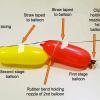
Achieving Orbit
Source Institutions
In this Engineering Design Challenge activity, learners will use balloons to investigate how a multi-stage rocket, like that used in the Interstellar Boundary Explorer (IBEX) mission, can propel a sat

Pollution Patrol
Source Institutions
In this activity, learners explore how engineers design devices that can detect the presence of pollutants in the air.

Density Rainbow and the Great Viscosity Race
Learners conduct two activities to investigate two properties of liquids: density and viscosity. In a clear container, learners stack 7 different liquids which will layer according to their density.

Divide and Conquer: Santa's Dirty Socks
Source Institutions
This activity introduces the idea of "divide and conquer" using a fictitious but serious problem--a pair of dirty socks has accidentally been wrapped in one of the presents that Santa is about to deli

Squeeze the Stream
Source Institutions
In this activity related to flight, learners build a tiny stream channel to investigate how fluids (air and water) change speed as they flow between and around objects.

Exploring Tools: Mitten Challenge
Source Institutions
In this activity, learners build a LEGO® structure while wearing mittens. This activity shows learners how difficult it is to build small things when your tools are too big.
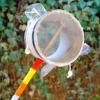
Torsion Drum
Source Institutions
In this activity, learners build a musical drum using a cardboard tube, plastic wrap, and beads.

Exploring Fabrication: Gummy Capsules
Source Institutions
In this activity, learners make self-assembled polymer spheres.

Building A Storm Drain
Source Institutions
In this design challenge, learners design a storm drain cover that catches litter to protect waterways to learn about how local actions can have system-level effects.

Mystery Shapes
Source Institutions
In this activity, learners describe an object they can’t see. After someone picks outs a few mystery objects and places them in a pillowcase, learners will investigate using only their hands.

Artificial Intelligence: The Intelligent Piece of Paper
Source Institutions
This activity explores what it means for a computer to be intelligent and introduces the topic of what a computer program is and how everything computers do simply involves following instructions writ
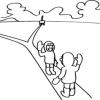
Ice Roads: Steiner Trees
Source Institutions
In this outdoor activity, learners use pegs (like tent pegs) and string or elastic to simulate drill sites and roads in Northern Canada.
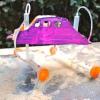
Hydraulic Car
Source Institutions
In this activity, learners build cars using syringes and water-powered hydraulics. Learners construct the car frame out of cardboard and set up a hydraulic system to raise and lower the car.
